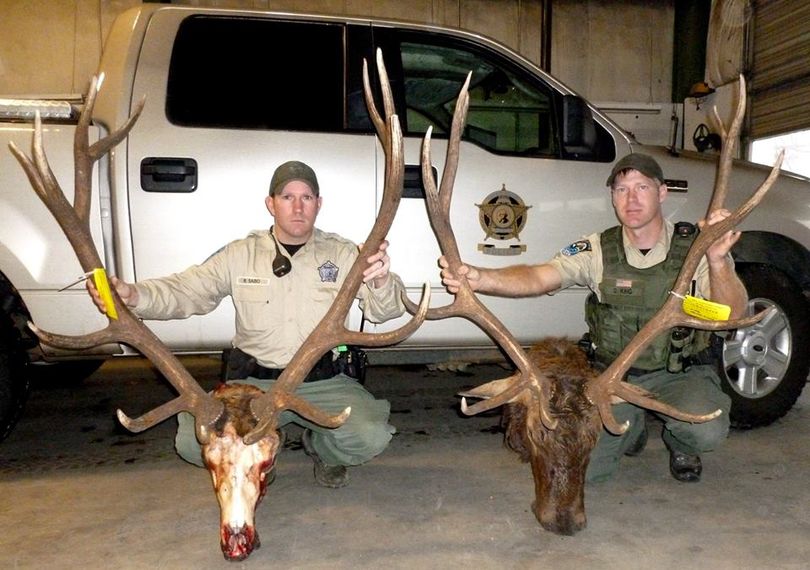Some say $6K fine too little for Asotin County bull elk poachers

POACHING -- The buzz around Blue Mountains big-game hunting circles suggests that two Asotin County men charged with illegally killed a pair of trophy bull elk got off easy this week with fines totalling $6,000 apiece.
Fines for the crimes committed could have added up to about $12,000 each plus some serious jail time. Sportsmen are posting online messages of outrage.
Some hunters has applied fruitlessly for decades for the chance to draw one of the few branch-antler bull tags offered in the Blue Mountains each year.
But Washington Fish and Wildlife police are just mildly disappointed in a recent plea agreement that spared the men lengthy jail terms and higher monetary penalties.
Sgt. Paul Mosman of Clarkston told the Lewiston Tribune they are happy Asotin County pursued to the end the case against Richard J. Kramer, 39, of Anatone, and his 23-year-old son Johnathan R. Kramer of Lewiston.
- In the recent case of poachers who used commercial gillnets to take hundreds of sportfish from Banks Lake, WDFW officers were more disappointed with light sentencing.
Here are details on the elk case from Tribune outdoors writer Eric Barker:
(The men) each pleaded guilty Wednesday to two counts of unlawful hunting of big game, two counts of wasting wildlife, two counts of unlawful transportation of wildlife and one count of unlawful hunting/retrieving on the property of another. Richard Kramer also pleaded guilty to two counts of unlawful use of a loaded firearm.
The men were accused of killing and wasting a pair of bull elk in a field near Anatone last November. The antlers and some choice cuts of meat were removed but the rest of the animals were left behind.
According to the plea deal, they were each given 10-day jail sentences and together must pay a monetary penalty of $12,000, plus additional court fines and fees. Because of a medical condition, Richard Kramer was sentenced to electronic home monitoring instead confinement in the country jail.
News of the plea agreement sparked some outrage on area social media pages. Mosman said he understands and to some degree share’s the public’s frustration.
“Obviously the community is pretty upset and we would have liked to see a little more enhanced penalties but I’ve seen a lot worse,” he said.
It’s not uncommon for poaching cases to include no jail time and little if any fines, he said.
“In the grand scheme of things it’s probably an indication of prosecutors being understaffed and overworked,” he said. “Across the state, they dismiss a lot of (poaching cases) so it’s nice to see them go through with this one.”
In the plea agreement, Asotin County Deputy Prosecutor Catherine E.
Enright dropped two counts each of spotlighting big game in the second degree. If the men had been convicted of the additional charges, they could have faced a combined fine of $24,000.
Officer Matt Sabo of Clarkston said more jail time would serve as a better deterrent to future poaching cases.
Enright defended the agreement, saying it is in line with other poaching cases prosecuted by the county.
“I don’t think it was too lenient, I think it was right in line where we come out on these poaching cases,” Enright said.
She said the extra monitoring required of inmates with medical needs can tax the jail staff and cost the county more money and that is the reason Richard Kramer is being allowed to serve his sentence at home.
“I think the electronic home monitoring issue is probably a better use of county resources,” she said. “It’s not like he is going to be able to go out and have fun. He is still on electronic home monitoring.”
In addition to the court penalties, Mosman said both men will lose their hunting privileges for two years in Washington and 44 other states, including Idaho, that are members of the Interstate Wildlife Violator Compact.
A rifle used to shoot the elk was forfeited to the department, according to Mosman. But a vehicle used to transport the elk heads and meat was not forfeited because it was registered to a third party.